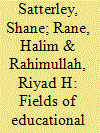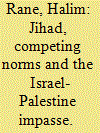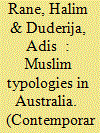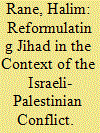|
|
|
Sort Order |
|
|
|
Items / Page
|
|
|
|
|
|
|
| Srl | Item |
| 1 |
ID:
191008


|
|
|
|
|
| Summary/Abstract |
This article contributes to our understanding of Islamist extremism by examining the relationship between early educational interests and ideas associated with Islamist-jihadist ideology. The article uses data collected through the Islam in Australia survey and specifically compares STEM (science, technology, engineering and mathematics) with HSS (humanities and social science) fields of educational interest in relation to respondents’ identification with political Islamist and militant typologies, identification with Islam as a political system, understandings of jihad and views on the caliphate as an Islamic religious obligation. The article found Muslim Australians who expressed an interest in STEM fields at high school were more likely than those interested in HSS to: (1) identify with the political Islamist and militant typology; (2) believe Islam advocates a political system; (3) believe establishing a caliphate is a religious obligation; and (4) define jihad as defensive and offensive rather than as defensive only. As discussed in the article, these findings support those of other research), which have identified an overrepresentation of STEM and an underrepresentation of HSS among Islamist-jihadists. This article adds weight to the assertion that the mindset of Islamist-jihadists, may be present prior to undertaking tertiary education and may predispose some to support extremist ideologies. This paper finds that an Islamist-jihadist ideological orientation has a relationship with the STEM fields broadly and Islamic studies specifically during adolescence.
|
|
|
|
|
|
|
|
|
|
|
|
|
|
|
|
| 2 |
ID:
086574


|
|
|
|
|
| Publication |
2009.
|
| Summary/Abstract |
A central factor in the failure to resolve the Israel-Palestine conflict is the direct competition that exists between its two most central international norms: 'self-determination', the fundamental claim of the Palestinians, and 'self-defence', the overriding concern of Israelis. Particularly since 9/11, Palestinian violence has been a liability for their cause and has served to validate Israel's self-defence arguments. Increasingly, Palestinian violence has been perpetrated by the Islamically oriented under the banner of jihad, which is understood almost exclusively in terms of armed struggle. Non-violence - which has the potential to undermine Israel's self-defence arguments and generate external pressure on Israel to adhere to the terms of a just peace - has been under-appreciated by such Palestinians. Non-violence is far from having a normative status in the Muslim world as an Islamically legitimate response to occupation and it is yet to be conceptualised as an effective form of resistance. The concept needs to be reformulated in accordance with the realities and opportunities confronting the Palestinians. Contextualisation combined with a maqasid or objective-oriented approach establishes non-violence as a preferable option to violence both in terms of the higher objectives of jihad, enshrined in the Quran, as well as of the attainment of Palestinian self-determination.
|
|
|
|
|
|
|
|
|
|
|
|
|
|
|
|
| 3 |
ID:
181150


|
|
|
|
|
| Summary/Abstract |
Numerous researchers in the field of Islamic and Muslim Studies have proposed various typologies to categorize Muslims in relation to their understanding of and identification with Islam. However, to date few studies have conducted the necessary empirical work to determine the numbers of Muslims that identify with the typologies that have been constructed. This article is the first to present findings based on a comprehensive study of Muslims in relation to a spectrum of discursive typologies. The authors conducted a national survey of Islam in Australia among Muslim citizens and permanent residents in 2019. This article examines Muslim Australians across a spectrum of 10 typologies in relation to various demographic factors, questions concerning shariah and political Islam, sources of influence, preferences for interpreting the Qur’an, views on various ethical, social, and theological issues, engagement with non-Muslims, and openness to new knowledge about Islam. Contrary to stereotypical views of Islam and Muslims, the article’s findings point to a strong presence for liberal and progressive typologies and interpretations of the Islamic tradition among Muslim Australians.
|
|
|
|
|
|
|
|
|
|
|
|
|
|
|
|
| 4 |
ID:
078265


|
|
|
|
|
| Publication |
2007.
|
| Summary/Abstract |
The Israeli-Palestinian conflict remains unresolved largely due to a failure to redress its asymmetry and the fact that the 'peace process' is not based on international law, specifically the resolutions of the United Nations. The mounting religious dimension is also perpetuating the conflict's intractability. The classical Islamic siyar1 with the doctrine of jihad at its core represents an authoritative 'Islamic' response to conflict and relations with non-Muslims. However, the militant response of some Palestinians to the Israeli occupation has been detrimental to their struggle for a restoration of rights, including self-determination. This article presents a theoretical framework for a reformulation of the classical doctrine of jihad. This reformulation must possess Islamic legitimacy, consistency with modern international norms, and the capacity to contribute to a just resolution of the conflict. The reformulation process needs to overcome the method of naskh (abrogation)2 and replace it with an approach to interpretation based on 'contextualization' so as to make accessible the broadest possible range of strategies in response to conflict contained in the Quran and the Prophetic traditions.3 Such a reformulation of jihad is necessary, though not sufficient, to generate the requisite international support for the norms of racial equality, dignity, and self-determination to redirect the strategic and material interests of influential states, shifting their foreign policies toward a just resolution of the conflict based on the resolutions of the United Nations
|
|
|
|
|
|
|
|
|
|
|
|
|
|
|
|
|
|
|
|
|